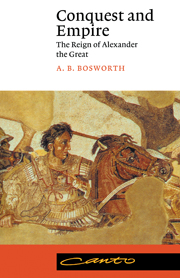Summary
The legacy of Philip
The period 336–323 B.C. is inevitably designated the age of Alexander. It marked a huge expansion of the imperial boundaries of Macedon, a virtually unparalleled outpouring of resources, material and human. Imperium terris, animos aequabit Olympo. The prophecy made for Romulus'; foundation applies even more appositely to the milieu of Alexander. His empire was in any sense world-wide, his concept of his person and achievements superhuman. From the time of his death his name has been an evocative symbol of worldly glory, alternately eulogised and excoriated as the type of the magnanimous conqueror or the intemperate tyrant; and the history of his reign has all too often been a thinly disguised biography, distorted by the personality and values of its author. This book is an attempt to analyse Alexander's impact on his world without any preconceived model of his personality or motives. Sineiraet studio is perhaps an impossible ideal, given the controversial and highly emotive nature of some of the subject matter, but one should at least attempt to base one's interpretation upon the extant sources. Even there we may find prejudice enough, but we have some prospect of identifying and discounting bias, both apologetic and vituperative. Our history of the period can only be fragmentary, based on episodes randomly highlighted in the literary tradition or the scattering of documentary evidence preserved by chance. We may not go beyond the material at our disposal.
- Type
- Chapter
- Information
- Conquest and EmpireThe Reign of Alexander the Great, pp. 5 - 24Publisher: Cambridge University PressPrint publication year: 1993

